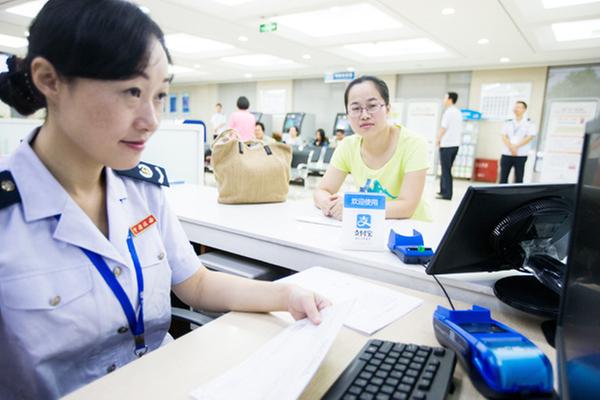Now, civic services go virtual, cashless

 |
| A citizen pays her taxes via Alipay, a mobile payment app developed by Ant Financial Services Group, the financial arm of Alibaba Group Holding Ltd, at the Xihu branch of Hangzhou Taxation Bureau in Zhejiang province, the first in China to adopt mobile payments in civic services. XU KANGPING / FOR CHINA DAILY |
Zhejiang province shows how to implement Internet Plus strategy at the ground level
This story is not about the use of e-wallets, QR codes and bar codes via mobile apps and digital payment tools for coffee, taxi rides, cinema tickets, groceries, sidewalk fast-food and what have you. That's old hat, in China at least.
Instead, this story is about how hundreds of social and other civic services of governments across China, particularly in some cities and regions, are becoming cashless, digital, real-time and internet-enabled.
Traffic fines, marriage pre-registration, remote diagnosis, utility bill payments, income tax filings, doctor appointments ... now need no more than a tap here and a code scan there.
Zhejiang province's capital Hangzhou, home to e-commerce major Alibaba Group Holding Ltd and its mobile payment unit Ant Financial Services Group, is spearheading the drive to make the national government's Internet Plus policy a reality at the ground level.
Hangzhou, Shanghai and Nanjing are among the cities that are utilizing mobile internet, big data and facial recognition technologies for frictionless and secure transactions in civic services, according to the 2016 China Internet Plus and Social Services Index.
In the process, they are showing how going digital could help streamline bureaucratic processes that bedevil government services.
Among the wealthiest provinces in the country, Zhejiang is keen to embrace digital channels so that citizens do not have to run an errand "for no more than once", according to Chen Guangsheng, the government's vice-secretary-general.
"This has become a reality thanks to the establishment of a virtual public payment platform, which effectively covers payments for the government's over 200 services. Residents can transact via the unified online portal," he said.
Zhejiang's virtual services were launched three years ago, and have since handled 15 million transactions worth 450 million yuan, said Chen. He foresees expansion into property transaction fees and health insurance.
Citizens can access the platform via Alipay. Combining location-based services with the payment function, Alipay guides users through its "City Service" that aggregates civic affairs, and redirects them to respective online pages to fill out information and make e-payments.
The self-employed and entrepreneurs find social security fund payments via the mobile app particularly convenient and time-saving. In the past, they had to spend hours and days on the paper work.
 |
| Twin sisters test the "smile to pay" device based on the facial recognition technology at a fair in Hangzhou, Zhejiang province. The device can easily distinguish the identical twins by scanning their faces. LONG WEI / FOR CHINA DAILY |
For, employers typically offer such services free for their staff while freelancers have to fend for themselves, said Cai Yuge, head of tax collection and management of the Zhejiang Local Taxation Bureau.
"Now, with a few swipes on the phone, they are entitled to the same benefits like every other wage-earner."
What's more, a mobile payment can produce an e-invoice with a QR code that can be used to get a hard-copy within 30 seconds.
Alipay has teamed up with local public security bureaus to match photographs in its database with a real-time snapshot taken by mobile phone users. If the results produce a match, no more identity verification steps are needed. The user can simply proceed to the transaction, Cai said.
The digital wave is also transforming Zhejiang's healthcare sector through the increasing adoption of remote diagnosis, an emerging field to get test results interpreted by medical experts in other locations.
This approach helps provide affordable healthcare solutions to people in underdeveloped regions and those living in poor health conditions.
For instance, Zhejiang's Shaoyifu Hospital encourages patients to make appointments and pay for medical bills with Alipay. It has also developed an indigenous app that connects patients with doctors, making post-surgery treatment accountable and traceable, said Cai Xiujun, head of Sir Run Run Shaw Hospital, which is affiliated to the School of Medicine at Zhejiang University.
"Especially for those suffering chronicle diseases, patients can leave a message about their symptoms, and the doctors would reply at the end of their day shift. It adds a personal touch to the medical service and significantly enhances efficiency," he said.




































